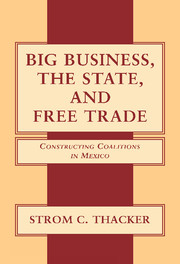Book contents
- Frontmatter
- Contents
- List of Figures
- List of Tables
- List of Abbreviations
- Acknowledgments
- 1 Introduction: International Context, Domestic Interests, and Mexican Trade Reform
- 2 Coalition Politics and Free Trade
- 3 Structural Power Relations Between Business and the Mexican State
- 4 Trade Policy Coalitions in the 1980s
- 5 Assembling Teams and Building Bridges
- 6 Business Participation in the NAFTA Negotiations
- 7 Conclusion: Mexico in Comparative Perspective
- Appendix
- References
- Index
6 - Business Participation in the NAFTA Negotiations
Published online by Cambridge University Press: 12 January 2010
- Frontmatter
- Contents
- List of Figures
- List of Tables
- List of Abbreviations
- Acknowledgments
- 1 Introduction: International Context, Domestic Interests, and Mexican Trade Reform
- 2 Coalition Politics and Free Trade
- 3 Structural Power Relations Between Business and the Mexican State
- 4 Trade Policy Coalitions in the 1980s
- 5 Assembling Teams and Building Bridges
- 6 Business Participation in the NAFTA Negotiations
- 7 Conclusion: Mexico in Comparative Perspective
- Appendix
- References
- Index
Summary
INTRODUCTION
Mexico's negotiation of NAFTA closely reflected the characteristics of the state's negotiating team and its ties to the private sector. These negotiations marked an important turning point in Mexican policy making, opening it up to the participation of limited, powerful elements of the business community. Though many business leaders had initially been highly skeptical of the sincerity of the government's offer to consult with the private sector, a high level of continuous interaction took place between the government negotiators and the COECE representatives during the NAFTA negotiations. According to an announcement by President Salinas in March 1992, government negotiators had already conducted 1,333 meetings with the representatives of the private sector to discuss the negotiating issues, including 522 from the very beginning of the NAFTA process until the initiation of the formal negotiations in June 1991, and 811 meetings through the side room during the negotiations from June 1991 to March 1992 (El Financiero, 18 March 1992). The pace of contact picked up as the negotiations progressed. According to SECOFI calculations, by the time the negotiations ended in August 1992, more than 2,600 meetings had been held between the government negotiators and private sector representatives (SECOFI 1993b).
The next section examines the nature, extent, and impact of the interactions that took place during the negotiations through the private sector's “side room” at the negotiating sites. It also analyzes the varying roles of the different strata of the business community, paying particular attention to the wide gap between the levels of participation of small and large business representatives.
- Type
- Chapter
- Information
- Big Business, The State, and Free TradeConstructing Coalitions in Mexico, pp. 162 - 184Publisher: Cambridge University PressPrint publication year: 2000



